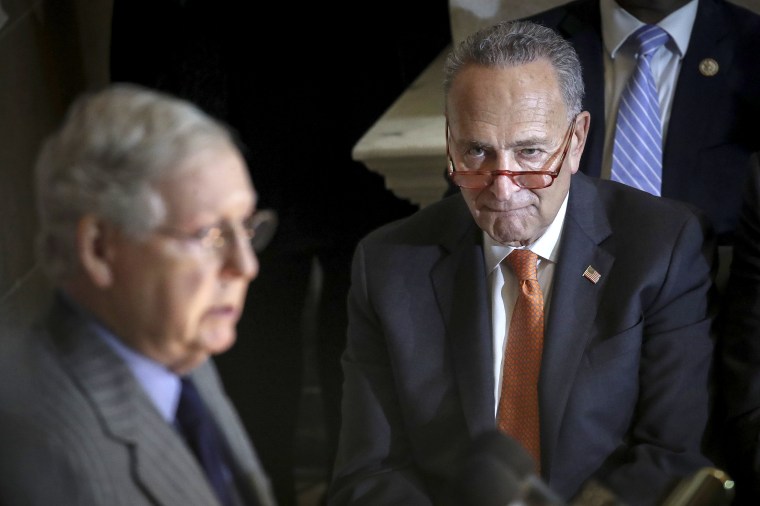The one thing everyone agreed on was that Congress was running out of time. According to the Treasury Department, the United States was scheduled to default on Oct. 18, which is why Senate Majority Leader Chuck Schumer announced plans to resolve the debt-ceiling crisis this week in order to prevent any adverse economic consequences.
As regular readers know, Republicans responsible for creating this mess had a single demand: GOP leaders insisted that Democrats diffuse the economic bomb by going through a lengthy and complex legislative process, which would've resulted in Republicans having a political weapon in the 2022 midterm elections. Democrats responded by saying there wasn't enough time to jump through the procedural hoops — even if they wanted to, which they didn't.
Yesterday, Senate Minority Leader Mitch McConnell offered a temporary way out, and the result was a newly announced agreement. NBC News reported this morning:
Senate Majority Leader Chuck Schumer on Thursday announced an agreement to extend the debt limit through early December, temporarily ending a partisan standoff just 11 days before the government's deadline to avert default. "It is our hope we can get this done as soon as today," Schumer, D-N.Y., said on the Senate floor.
Though it's not yet clear exactly how or when Congress will approve the deal, the agreement would raise the borrowing limit by $480 billion, pushing the new deadline to Dec. 3.
The date was not chosen at random: Last week's deal to prevent a government shutdown also moved the funding deadline to Dec. 3. In other words, lawmakers have created an important new challenge — you're going to be seeing a lot of "cliff" references in the coming weeks — that will combine two important and necessary tasks.
Or put another way, we can all breathe a sigh of relief that Republicans didn't shut down the government or crash the economy on purpose — Wall Street seemed especially delighted by this morning's news — but the reprieve is temporary.
As the process moves forward, let's run through a quick Q&A.
Why did McConnell make this offer?
The GOP leader hasn't exactly been forthcoming about his motivations, but McConnell reportedly told his members that he believed Senate Democrats might very well end debt-ceiling filibusters altogether, and this offer prevented that from happening at least for now.
How does this affect McConnell's larger demands?
For the most part, it doesn't affect the GOP's plan at all. Republicans desperately wanted Democrats to go through the reconciliation process — creating a dollar figure, instead of suspending the debt ceiling to a future date — and Republicans will continue to make this demand every day between now and December. The basics of the GOP's legislative posture — no clean bill, no attaching the debt ceiling to some other bill, and no nuclear option — will be identical to everything we've heard from the party in recent weeks.
The implicit message behind McConnell's debt-ceiling offer was plain: "You don't have time to pay my ransom the way I want it to be paid, so I'm prepared to give you more time to do exactly what I command you to do."
Why are Democrats agreeing to the deal?
First, because it prevents default in 11 days. Second, Democrats were determined to avoid going over the cliff, but the party wasn't yet unified on a solution, and there was limited time to settle on one. And third, as Politico noted this morning, "The view from the White House and many Senate Democrats is that the McConnell deal frees up the rest of October and November to focus on their reconciliation package."
Why are Republicans agreeing to the deal?
First, it keeps open the possibility that Democrats will eventually meet McConnell's demands. Second, it derails, at least for now, the growing talk of ending debt-ceiling filibusters altogether. And third, as we saw during Barack Obama's presidency, McConnell sees political value in keeping the political world off-balance through temporary deals.
As Adam Jentleson, who served as a top aide to former Senate Majority Leader Harry Reid, noted yesterday, McConnell's reliance on stopgaps throughout the Obama era "created constant dysfunction and nonstop crises, all of which empowered Republicans, weakened Democrats, and had bad downstream policy consequences."
To be sure, avoiding the Oct. 18 deadline is good news, but this is obviously a kick-the-can-down-the-road agreement, and there's no reason to believe things will go smoothly ahead of Dec. 3.
The Republican line is unchanged: The GOP minority is committed to filibustering any debt-ceiling measure that fails to put a specific dollar figure on the debt. The Democratic line is also unchanged: The governing majority is committed to addressing the debt ceiling, but not through the reconciliation process that would put a specific dollar figure on the debt.
That leaves one obvious answer — scrapping debt-ceiling filibusters is an easy, obvious, simple, efficient, and effective solution, which wouldn't cost a dime — that Democratic Sen. Joe Manchin of West Virginia doesn't like.
Watch this space.

